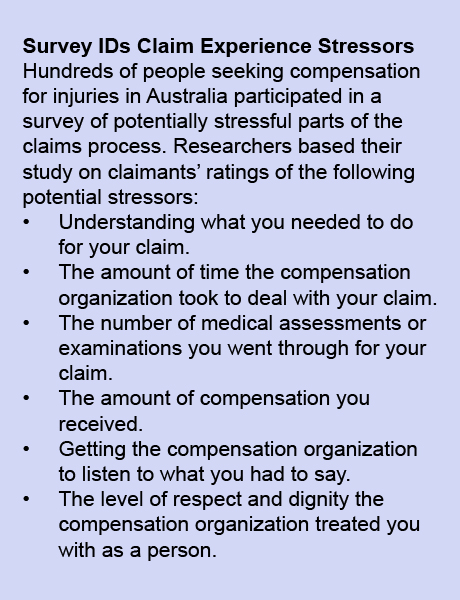Hidden Cost Driver
Is Workers’ Comp an Obstacle to Recovery?

Workers’ comp practitioners trying to rein in costs may be shooting themselves in the foot, suggests a new study. It provides evidence that the very process of filing for workers’ comp benefits may prolong disability.
The complexity of the system is itself a cause of stress, say the researchers. While controlling for nearly every conceivable variable — including an individual’s vulnerability to stress, the study found clear evidence that may lead payers to consider simplifying and better explaining the workers’ comp system.
“Many claimants experience high levels of stress from engaging with injury compensation schemes, and this experience is positively correlated with poor long-term recovery,” said the authors. “Intervening early to boost resilience among those at risk of stressful claims experiences and redesigning compensation processes to reduce their stressfulness may improve recovery and save money.”
System Backfiring?
The study, Relationship Between Stressfulness of Claiming for Injury Compensation and Long-term Recovery; A Prospective Cohort Study, was published in the Journal of the American Medical Association. The researchers looked at data for claimants who had been briefly hospitalized in Australia between 2002 and 2006. They then interviewed them six years later, between January 2011 and May 2012.
The 332 participants included 82 who had filed workers’ comp claims, while the remainder had sought benefits following motor vehicle accidents. “Although a central goal of such schemes is to help return injured persons to work and health, there are growing concerns that they may have the opposite effect,” the authors wrote.
“Previous research suggests that these claimants have worse long-term health outcomes than persons whose injuries fall outside compensation schemes. However, existing studies have substantial methodological weaknesses and have not identified which aspects of the claiming experience may drive these effects.”
The researchers interviewed the participants to identify the most stressful parts of the claiming experience. Using multivariable regression analysis, they tested for associations between the stress factors and health status at 6 years, adjusting for baseline determinants of long-term health status and predisposition to stressful experiences.
The researchers identified potentially stressful elements of the claims experience and asked the participants to rate them.
 The study adjusted for factors that could affect recovery from injury, such as the claimant’s age, psychiatric history, severity of the injury, and psychological response to the injury. They also adjusted the analysis for vulnerability factors that could affect the claimant’s psychological response to the claims process, using a propensity score method.
The study adjusted for factors that could affect recovery from injury, such as the claimant’s age, psychiatric history, severity of the injury, and psychological response to the injury. They also adjusted the analysis for vulnerability factors that could affect the claimant’s psychological response to the claims process, using a propensity score method.
“For every stressor–health outcome combination examined, this adjustment reduced the magnitude of the association; in one-third of the combinations, the association was significant before adjusting for this factor but not after,” they wrote. “This finding suggests that analyses of compensation health effects that ignore claimants’ predisposition to stress, as all previous studies that we are aware of have done, are likely to exaggerate the size of these effects.”
Trigger Points
“Some degree of claimant stress in the compensation experience may be unavoidable. To determine eligibility and levels of compensation, schemes must collect, investigate, and test evidence,” the study said. “However, our findings highlight parts of the system that appear especially prone to inducing the types of stresses among claimants that may hinder recovery.”
More than one-third of the participants — 33.9 percent — rated “understanding what they needed to do for their claim” as the most stressful aspect of the claims process. Another 30.4 percent identified “the amount of time that the scheme took to deal with their claim” as most stressful.
Other stressors reported were:
- The number of medical assessments — 26.9 percent.
- The amount of compensation they eventually received — 26.1 percent.
- Getting the compensation organization to listen to what claimants had to say — 22.1 percent.
- The level of respect and dignity afforded claimants by the compensation organization — 18.3 percent.
Claimants who reported high stress levels from the filing process had poorer outcomes six years later. Specifically, they had “significantly higher levels of disability (+6.94 points based on the World Health Organization Disability Assessment Schedule sum score), anxiety and depression (+1.89 points and +2.61 points, respectively based on the Hospital Anxiety and Depression Scale), and lower quality of life (−0.73 points based on the World Health Organization Quality of Life instrument, overall item), compared with other claimants.”
“Our findings point to two potential strategies for improving the recovery of claimants in compensation schemes for personal injury,” the authors wrote. “One approach would focus on redesigning schemes to make them less stressful for claimants.”
That can be accomplished by starting with processes that are the most stressful; i.e., those associated with claimants’ understanding of what is needed of them and the time involved in processing their claims.










